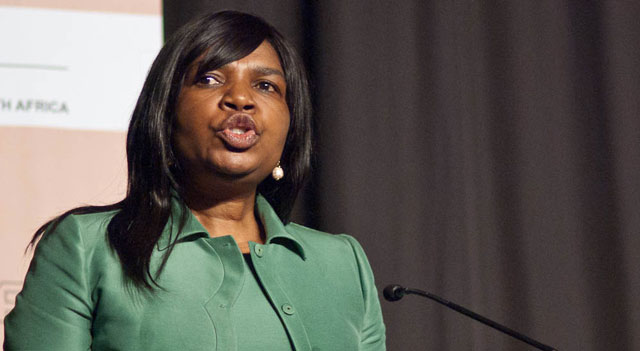
Amid calls by the Democratic Alliance for President Jacob Zuma to fire her, communications minister Dina Pule has hit back at a weekend newspaper report that said her alleged boyfriend, Phosane Mngqibisa, potentially stood to gain from a political instruction she gave in 2012.
The Sunday Times reported that AU Communications, the local partner of Europe’s Nagravision, is headed by Rudy Rashama, a business partner of Mngqibisa’s. Nagravision was set to supply the control system for digital terrestrial television because it is the chosen technology partner of state-owned broadcasting signal distributor Sentech, which Pule instructed in May 2012 to manage the control system.
Pule’s instruction was overturned by the high court in December after free-to-air broadcaster e.tv took her to court objecting to her decision. Acting high court judge CG Pretorius found that the minister’s decision was “unlawful”. Pule then filed an application for leave to appeal, but quickly withdrew it and entered into talks with affected broadcasters, including e.tv and the SABC.
Pule’s spokesman, Siya Qoza, on Sunday afternoon issued a statement in which the minister takes umbrage at the Sunday Times report, accusing the newspaper of being “engaged in a politically motivated smear campaign”.
The statement doesn’t address the newspaper’s allegations that Mngqibisa may have stood to benefit financially from her decision to make Sentech the manager of the digital control system, which is needed, among other things, to prevent the sale of state-subsidised television set-top boxes outside the country’s borders.
For the sake of completeness, the full, unedited text of Qoza’s statement follows below:
The Minister and the Department of Communications respects the right of the media to report in the public interest. The Minister believes that press freedom is one of the key anchors in our young and vibrant democracy.
The Minister is concerned that the Sunday Times appears to be engaged in a politically motivated smear campaign that is characterised by the newspaper throwing mud at the her, in the hope that something would stick.
The latest mud-throwing exercise is contained in the story that appears in the Sunday Times of 03 March 2013, headlined “Pule’s unlawful ruling swayed TV-signal deal.”
This story contains facts that are misleading. There is no TV-signal deal in South Africa in relation to the conditional access system for the Set Top Boxes that are required for the digital migration process that the country will be embarking on later this year.
The Set Top Box conditional access system is a legal requirement that is contained in the Broadcast Digital Migration Policy of 2010.
Both the broadcasters and the State want it. The State wants it because it can help disable decoders that are reported as stolen and it can assist the Government to deliver some e-Government services such as providing an early warning system to tv-owning households that may be facing a natural disaster.
In line with this desire, former Minister of Communications, the late Mr Roy Padayachie, asked the broadcasters to appoint a vendor for the conditional access system in March 2011.
The tender that was issued by the broadcasters to appoint a conditional access vendor expired without a decision being made.
It is therefore untruthful for the Sunday Times to suggest that the broadcasters had chosen NDS as the vendor for the control system when the broadcasters never decided on their preferred supplier.
In May 2012, nearly 14 months after Mr Padayachie’s letter, the broadcasters had not appointed a vendor.
Following this debacle Minister Dina Pule wrote a letter to the SABC in May to appoint Sentech, the State-owned signal distributor, to administer the conditional access system in the government subsidised Set Top Boxes. This decision was made to ensure that the State was able to protect the huge investment it is making in subsidising the poorest five million tv-owning households in South Africa.
The Sunday Times inaccurately claims that Minister Pule appointed Nagravision to install the conditional access system. This is untrue. The letter refers only to the appointment of Sentech.
Minister Pule’s decision was challenge by etv in court and the South Gauteng High Court ruled in favour of all free to air broadcasters controlling the conditional access system, subject to the authority of industry regulator, Icasa.
In January 2013, Minister Pule appealed the decision of the court and simultaneously pursued a negotiated agreement with all the parties concerned.
The progress of the negotiations convinced Minister Pule to withdraw the appeal in February 2013.
The broadcasters have indicated that they’ll be in a position to advise the Department of their decision during March 2013.
The decision to seek finality on a vendor for the conditional access system is in line with the other decisions that Minister Pule has taken since taking office, towards ensuring that South Africa meets the June 2015 deadline to migrate the broadcasting signal from analogue to a digital platform.
In March, she finalised the Scheme of Ownership Support of Set-Top-Box Rollout Framework and the Set Top Box Manufacturing Strategy.
She has also consulted Icasa to finalise the broadcasting regulations for the digital era.
The Sunday Times also claims that Minister Pule was conflicted in appointing Sentech because she chaired the panel that appointed the Digital Dzonga.
The Digital Dzonga had 15 members, most of whom worked in the sector. Does the Sunday Times suggest that there is a conflict of interest when it deals with these individuals.
The Department has, over a long time, partnered with different social partners to help it deliver ICT services to South Africans. It chose this route because it wants to tap into the skills that reside within the sector to improve the quality of the lives of South Africans.
For example, the Department is partnering with the private sector, civil society and other government departments to shape the future ICT policy for the country, first through the ICT Policy Colloquium and now through the ICT Policy Review Panel.
It also partnered with the private sector in the hosting of the ICT Indaba that provided a platform for African ministers, regulators, businesses, including small businesses, the youth and scholars to interact and find ways to use ICTs to advance Africa’s development.
The Sunday Times alleged that Minister Pule’s involvement in the ICT Indaba was improper, without ever providing any evidence of such. Instead, the Sunday Times has written extensively about an apparent fall out between the main contractor for the ICT Indaba and a subcontractor.
The Sunday Times has on numerous occasions reported that the sponsors of the ICT Indaba received the deliverables they had paid for through their sponsorship at the Indaba.
Interestingly, the Sunday Times does not report the fact that the Minister was sufficiently concerned about the allegations of wrongdoing in relation to the ICT Indaba to the point where she asked the Office of the Auditor General to establish the facts.
The Office of the Auditor General has since found that there was no evidence of wrongdoing by the Minister or any of the Department’s officials.
Neither the Minister nor the Department has any jurisdiction to interfere with the operations of private companies.
The Minister is cooperating fully with the Public Protector and Parliament’s Joint Committee on Ethic and Members Interests in their work to look into these allegations.
What is even more concerning are the lengths the Sunday Times seems to be prepared to go to in sustaining its story. In a story it carried on 09 September 2012, the Sunday Times admitted that it had misled its readers by quoting Carol Bouwer’s spokesperson, Victor Dlamini, as claiming that Minister Pule was bought shoes in Barcelona in a story that was published on 02 September 2012.
In this puzzling public admission by the newspaper, it claimed that Carol Bouwer had in fact given them the information about the shoes. The newspaper even made the extraordinary announcement that Bouwer had fired Dlamini, after Dlamini told online publication, IT Web, that he never mentioned the allegation about the shoes to the Sunday Times and that all his communication with them was via email.
Makes you wonder what the Sunday Times real interest in this story is and who’s agenda are they pursuing?




